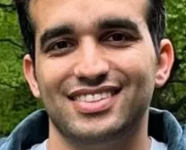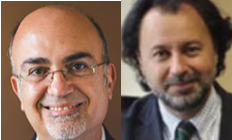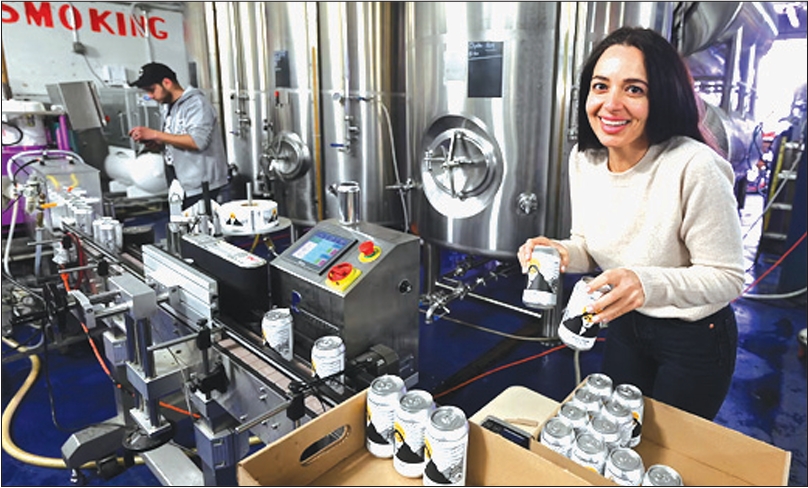And he’s counting calories because he remembers that he always packed on more weight when he was on the road
Name a foodstuff and Omid can tell you how many calories it contains. A packet of sliced cooked chicken is about 100, he says, and an apple will be about 50.
“And together that’s a meal. So if I have that for lunch, and porridge for breakfast, then I’ve got enough calories left over to have a really good dinner,” he told the Coventry Evening Telegraph as he arrived in town for an evening of stand-up.
Calorie counting is his “new revelation” and he’s preaching about it with true devotion, but he looks as cuddly today as he was in films such as “Gladiator,” “The Infidel” or his one-year appearance on American television playing an Iranian doorman at Whoopie Goldberg’s hotel.
The Anglo-Iranian comedian admits he hasn’t actually lost any weight yet. “I’m fighting with calories just to stay the same weight so I don’t blow up,” he says. “Recently I saw myself and I was so horrified that I decided to do something about it. I’d look stupid in a T-shirt and jeans so I thought I’d wear a suit. And I looked ridiculous.”
Djalili was born in Iran and came to England as a boy. Soon he found his gift for making others laugh. He also found a skill with accents. When he started touring as an unknown foreigner with a funny name, he would come on stage speaking broken English, which the audience assumed was the best this guy could do. Then in mid-sentence, he would shift to a Scottish brogue; next it was a Merseyside (Liverpool) accent, then Cockney, before settling down with the Queen’s English.
That worked fine when he was an unknown. But it seems everyone in the British Isles knows him now—especially after he got his own show on the BBC.
The 46-year-old decided he wanted to be an actor in his teens when, during a long boring summer, he stole his brother’s movie theater pass and overdosed on films. “I wanted to be like Al Pacino, Dustin Hoffman and Robert De Niro, probably because they’re all short and dark like me.”
Although Omid was rejected by 16 drama schools, he never gave up and went to Europe to appear in “weird experimental theater in Czechoslovakia.”
Omid has mined his mixed heritage for comic material in the past, and his new show continues that up to a point.
“I don’t think my Iranian-ness is that interesting to people anymore, but you can see so much truth in the microcosm of one person’s world. All comedy is about something. If you laugh it means there’s a truth there,” he says.
Djalili found the urge to hit the road once again after doing a standup show for a business. “Last Christmas, I did a corporate gig, which can be notoriously difficult and I was so nervous I couldn’t go on,” he said.
“I hadn’t done a gig in about a year. The event organizers were getting nervous that I wouldn’t go on so they cited all kinds of legality at me if I failed to perform. As I took to the stage, my mind was telling me, ‘You’re going to die. You’re just a fat, needy man pleading for attention. You have no integrity and the act has no artistic merit. That’s why I’m here, for the money, not because I care or they care. They don’t even like me.’
“I went out with that devil on my shoulder, and on the other shoulder was another one going, ‘Listen to the devil on the other shoulder, he’s right.’ Then the opening joke got more laughs than I’d expected. I started thinking, ‘They are laughing because you’re famous, not because you’re funny.’ It was at that moment I thought, ‘They’re laughing and I’m not even funny — I’m going on tour’.”
In recent years in England, he made two successful seasons of his own comedy show for BBC1, as well as starring as Fagin in the West End production of Oliver. He’s done some films and appeared in the US on NBC’s The Paul Reiser Show.
His new standup show focuses on some of the world’s best and worst thinkers. “It’s based on an Eleanor Roosevelt quote about the different levels of thinking. She said, ‘Great minds talk about ideas, average minds talk about events, and small minds only talk about other people.’ In stand-up, you do all those things — you talk about other people, you make sense of events and you elevate lofty ideas.
The material also covers recent events in the Middle East. “There are so many different levels to what is happening now with profound transformation in Egypt, Bahrain, Syria and Libya. But the people of Dubai have a very British attitude to revolution: marching in the streets chanting ‘What do we want — democracy. When do we want it — after happy hour.’”
























